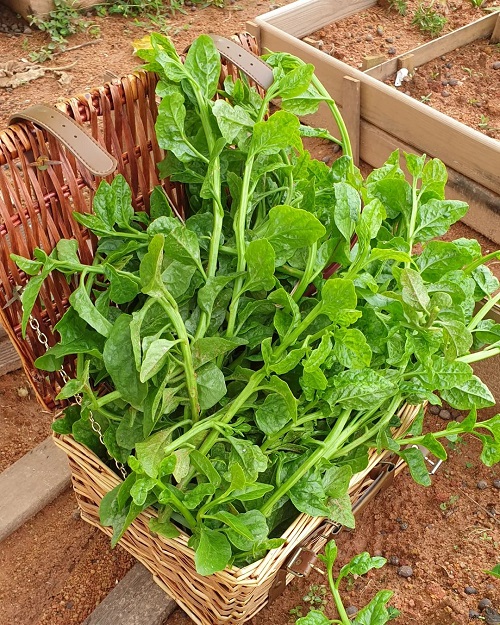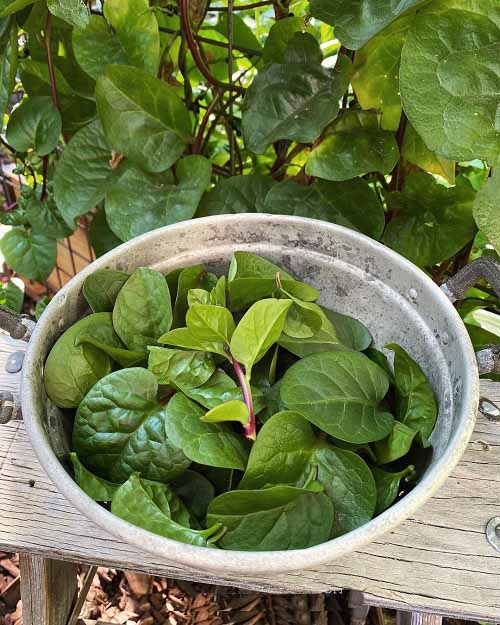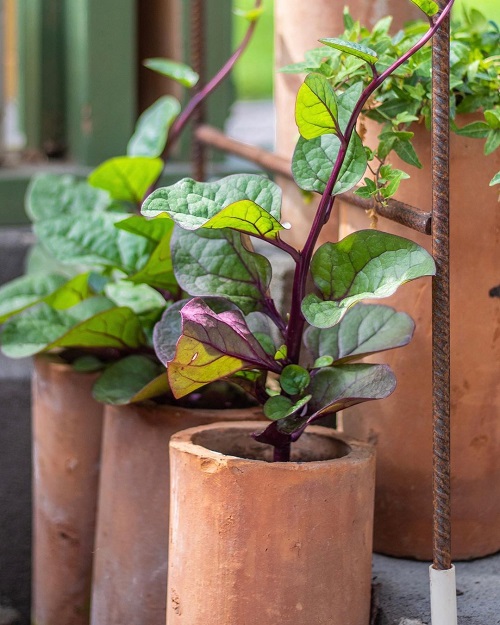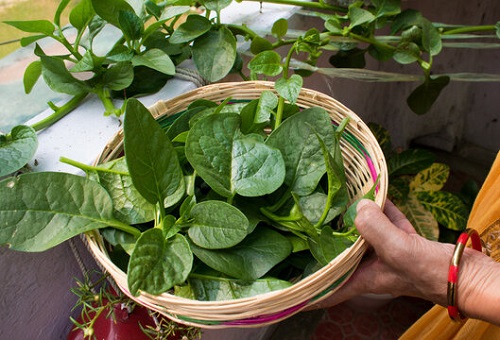If you are not aware of the Malabar Spinach Benefits, then you are surely missing on a green powerhouse! Keep reading to get surprised!

Discover amazing Malabar Spinach Benefits – a nutrient-packed leafy green that’s bursting with benefits for your health and well-being. Often overlooked in favor of its more common counterparts, this vibrant vine is not only a culinary delight but also a powerhouse of vitamins, antioxidants, and medicinal properties. Whether you’re a health-conscious eater, an adventurous foodie, or someone simply looking to elevate their diet, Malabar Spinach is a revelation waiting to happen!
What is Malabar Spinach
Malabar spinach, a tropical leafy green, derives its name from a coastal region in southwestern India. While it bears a resemblance to true spinach, botanically speaking, it differs from it. The glossy, dark green leaves, which are either oval or heart-shaped, can be consumed either raw in salads or cooked.
The taste of Malabar spinach is mild, reminiscent of spinach, with subtle peppery undertones and a hint of citrus. However, when cooked, its texture diverges from that of spinach. Its thick, semi-succulent leaves tend to become somewhat sticky, akin to okra.
It exhibits vertical growth and necessitates the support of a trellis due to its rapid development. In regions with hot climates and winters free of frost, it can be cultivated as a perennial plant. Otherwise, it functions as an annual vegetable, much like regular spinach. Besides its culinary appeal, Malabar spinach adds an aesthetically pleasing touch to garden beds, particularly the red-leaf variety.
Growing Malabar Spinach in Pots and Benefits
Malabar Spinach Benefits
1. Great Mineral Source

Basella leaves serve as excellent mineral sources, containing essential nutrients such as potassium (providing 11% of the recommended daily allowance per 100 grams), manganese (32% of RDA/100 g), calcium, magnesium, and copper.
Potassium plays a vital role in regulating heart rate and blood pressure, as it is a crucial component of cells and bodily fluids. Manganese and copper are utilized by the human body as co-factors for the antioxidant enzyme known as superoxide dismutase.
2. Rich in B-complex
Malabar spinach is also rich in several B-complex vitamins, including folate, vitamin B6 (pyridoxine), and riboflavin. A serving of 100 grams of fresh leaves contains 140 µg or 35% of the recommended daily intake of folates.
Folate is a crucial nutrient for DNA synthesis and growth, and a deficiency during early pregnancy can lead to neural tube defects in newborn babies. It is recommended that expectant and pregnant women consume ample amounts of fresh greens to reduce the risk of neural tube defects in their children.
Amazing Jasmine Plant Benefits You Should Know
3. Good Source of Iron
Similar to spinach, Malabar spinach is also a remarkable source of iron. A serving of 100 grams of fresh leaves provides approximately 1.20 mg or 15% of the recommended daily intake of iron. Iron is a vital trace element necessary for the production of red blood cells (RBCs) in the human body. Furthermore, it serves as a co-factor for the oxidation-reduction enzyme called cytochrome oxidase, which plays a role in cellular metabolism.
The iron content in Malabar spinach can help prevent iron deficiency anemia and promote the production of healthy red blood cells.
4. Excellent in Detoxification

Malabar spinach contains chlorophyll, a natural detoxifying agent that aids in the elimination of toxins from the body. This can contribute to overall detoxification and improved organ function.
5. Have Anti-inflammatory Properties
Malabar spinach contains certain compounds that possess anti-inflammatory properties. Regular consumption may help reduce inflammation in the body and alleviate symptoms associated with inflammatory conditions.
Potent Insulin Plant Benefits and Uses (Backed by Science)
6. Best for Hydration

Malabar spinach has a high water content, which helps in maintaining proper hydration levels in the body. Staying hydrated is essential for various bodily functions and overall well-being.
7. Improve Eye Health
The presence of vitamin A and other antioxidants in Malabar spinach promotes good vision and helps protect the eyes from age-related macular degeneration and other eye disorders.
8. Maintain Heart Health

The high potassium content in Malabar spinach can help maintain healthy blood pressure levels, reducing the risk of cardiovascular diseases. Additionally, its low sodium content further contributes to heart health.
9. Aids in Weight Management
Malabar spinach is low in calories and fat while being rich in fiber. This combination makes it a great addition to a balanced diet for those looking to manage their weight. The fiber content helps create a feeling of fullness, reducing the likelihood of overeating.
Basella is characterized by its low calorie and fat content, with only 19 calories in a 100-gram serving of raw leaves. Despite its low caloric value, it is abundant in vitamins, minerals, and antioxidants, making it an excellent source of essential nutrients.
Best Medicinal Plants with Their Benefits
10. Strengthen Digestive Health

Malabar spinach is rich in dietary fiber, which aids in digestion and helps prevent constipation. Including Malabar spinach in your diet can promote a healthy digestive system and support regular bowel movements.
11. Have Antioxidant properties
The presence of antioxidants in Malabar spinach, such as beta-carotene, vitamin C, and vitamin E, helps combat free radicals in the body. This can potentially reduce the risk of chronic diseases and cellular damage caused by oxidative stress.
Check out the Best Leafy Green Vegetables to Grow in Containers here
Malabar Spinach Nutrition Profile
Malabar Spinach boasts a remarkable nutritional profile, providing just 19 calories, 3.4g of carbohydrates, and a minimal amount of fat (0.3g) per 100g serving. It shines in the protein department, offering a substantial 1.8g of protein.
Furthermore, it is abundant in essential vitamins such as Vitamin A, Thiamine, Riboflavin, Niacin, Vitamin B6, and Vitamin C. Its mineral composition is equally impressive, featuring Calcium, Iron, Magnesium, Phosphorus, Potassium, and Zinc.


